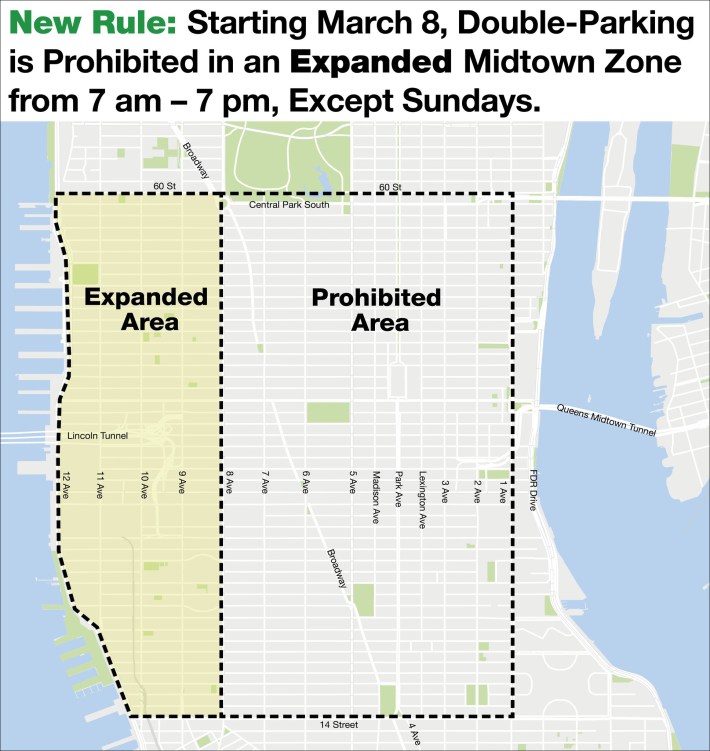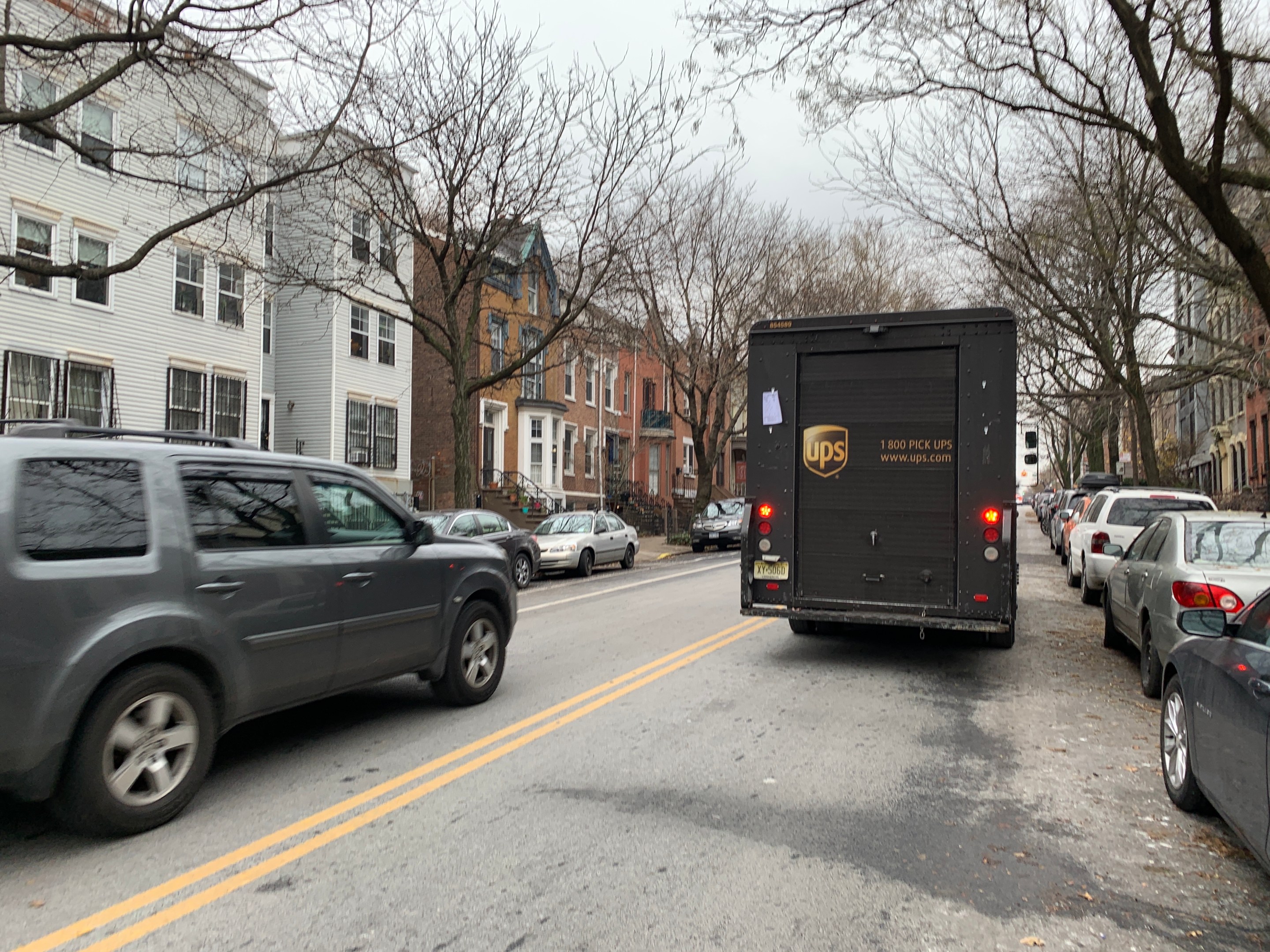This is going to change things ... expeditiously!
In a bombshell rule change announced in a tweet this morning, the Department of Transportation revealed that starting in 30 days, commercial truckers can no longer double-park if they are making "expeditious" deliveries — vague, easily-flouted language that had effectively made it impossible to crack down on double-parking.
To be clear, the importance of the rule change is buried in bureaucratic language massaged by teams of lawyers, but here are the basics:
- The old rule allows truckers to double-park "while expeditiously making pickups, deliveries or service calls." The new law says truckers can double-park "for no more than 20 minutes while actively engaged in loading or unloading goods, tools, materials, or other items for the purpose of making pickups, deliveries or service calls."
- The old rule had no language about trucks that block roadways. The new law makes it clear: "No person shall double-park a commercial vehicle when it blocks the only lane of travel in the same direction. No person shall stand, stop or park a vehicle on a street at any time in such a manner or under such conditions as to leave fewer than 10 feet of roadway width available for the free movement of vehicular traffic."
- The old rule bars commercial double-parking in a Midtown zone bordered by 14th Street, First Avenue, 60th Street and Eighth Avenue. The new rule expands the zone all the way to 12th Avenue. As now, the new rule allows double-parking on Sundays. (See map below.)
- The old rule would allow a vehicle or "combination of vehicles" to double-park in Midtown if they were making "expeditious" deliveries. The new rule takes out the permission for companies to use multiple vehicles and also reiterates that the delivery workers must be "actively engaged in loading or unloading goods, tools, materials, or other items for the purpose."

The rule change dates back to a "Clear Lanes" promise quietly unveiled by Mayor de Blasio back in October, 2017. The mayor is also expected to announce more truck restrictions in the coming weeks.
Cycling advocates hailed the new rules, given that "expeditious" trucks have forced riders into traffic, where several have been killed.
“This rule change validates very real public safety concerns, namely that double parking is dangerous for all road users,” said Transportation Alternatives Executive Director Danny Harris. “We know all too well the threat posed when people on bikes are forced out of their lane and into mixed traffic.”
Of course, other experts pointed out the limits of the rule change.
“We strongly support DOT’s rule change," said Jon Orcutt of Bike New York. "But as with anything in NYC traffic law, it’s will only be as significant as the enforcement that follows. When Tolstoy said, ‘Writing laws is easy, but governing is difficult,’ he was clearly thinking about the streets of New York.”
The reference is to famed Russian author Lev Tolstoy, who serialized his most famous novel "War and Peace" in 1865, when double-parking meant horses and carriages. His later non-fiction work, "What is to be Done?" could certainly be seen as a warning about the capitalist, delivery-enabled future.
"But yet the village is the source of all wealth and it is only there that real wealth is to be found: grain, and timber, and horses, and everything," he wrote. "Why come to town to obtain what is in the country?"
Orcutt's larger reference is to the city's Stipulated Fine Program, which was created during the Bloomberg administration to reduce parking summons fees levied against trucking companies in exchange for the companies no longer contesting most of their double-parking tickets under the "expeditious delivery" caveat. The rule change doesn't change the discount that trucking companies receive on double-parking tickets, but may encourage the NYPD to write far more of them going forward.
But Queens Council Member Costa Constantinides — who has called for the end of the Stipulated Fine Program — was still unsatisfied.
“Double-parked trucks are a public safety threat we could easily quash by ending the policies that give big delivery companies a free pass,” Constantinides said. “The DOT’s bold warning to trucks who clog our streets and create death traps for cyclists and pedestrians is a good first step. We still must end the Stipulated Fine Program and promote overnight deliveries in dense, already over-polluted sections of our city.”
Streetsblog has reached out to DHL, Amazon, UPS and the United States Postal Service — repeat offenders — and will update this story if we hear back.
After initial publication of this story, UPS sent over the following lengthy statement:
We are reviewing the new rules and the impact they will have on our business. Making deliveries in urban environments poses additional challenges for any companies involved, whether its transportation companies like UPS or food and beverage suppliers. UPS reduces the number of vehicles on city streets by consolidating packages loaded onto trucks based on delivery time commitments and final destinations, and equips drivers with technology to choose the most direct delivery routes to reduce unnecessary driving. We also offer free services like UPS My Choice® and the UPS Access Point® network that enable consumers to receive their deliveries where and when they want, helping reduce redelivery attempts. Additionally, UPS has one network, with one driver, rather than a separate driver who only delivers express shipments, another one who delivers ground packages to homes, and yet another who delivers to businesses.
In every metropolitan area today, especially in the U.S., there’s a scarcity of commercial vehicle parking, which often forces deliveries to be made in a way that seemingly conflicts with other road uses, like biking. The reality, though, is that active transportation modes and freight services do not need to conflict. The underlying issue is how cities manage the curb and how they allocate space. Simply put, the curb today in most American cities is overwhelmingly devoted to single occupancy personal vehicle parking, which is simply unsustainable and not aligned with most cities’ stated transportation priorities, like shared mobility, active transportation, safety, equity and commercial goods movement.
UPS drivers are taught to park safely and legally, and be as expedient as possible on all deliveries to minimize parked time.
UPS is working with many cities around the world to promote new best practices in urban goods movement and to work cooperatively toward solutions that reduce environmental, congestion and safety impacts. In fact, UPS has deployed more than 30 sustainable urban delivery pilot projects around the world, including innovative uses of pedal-assist bikes (including in New York City), and working together with micro-depot solutions in crowded inner-cities. UPS is actively exploring how it can work jointly with city officials and regulators to promote a safer, more sustainable and less congested transportation environment for all users, from bikes to trucks to pedestrians.






